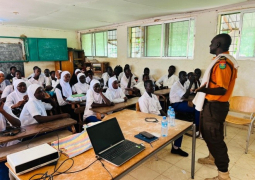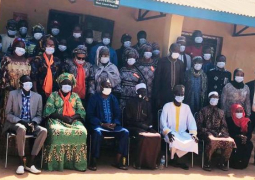
According to the Ministry of Basic and Secondary Education’s report in 2020, the impact of covid-19 affected about 674, 300 students from Early Childhood Development (ECD) to senior secondary schools. The affected students mentioned above are the ones directly under the purview of the Ministry of Basic and Secondary Education (MoBSE).
The Ministry further said, the closure did not only have serious negative impact on students, teachers, and families, but have far-reaching economic and societal consequences and more severe for disadvantaged students and their families, causing interrupted learning for them.
“The closure of schools which was as a result of the pandemic also resulted in many dropouts, with girls being the highest number,” said Essa Sowe, deputy general secretary, The Gambia Teachers Union during an interview with The Point Newspaper.
Mr. Sowe added that the pandemic also made MOBSE introduce physical distance learning, which he said, reduced half of its normal percentage of students during the covid-19.
He added that children also found it difficult to be enrolled, due to insufficient space.
“The impacts of COVID-19 on students also compromised the contacts amongst students. These are usually during their break times, and instructional hours of the schools. This could not happen because they were all asked to sit at home,” Mr. Sowe opined.
In terms of retention, he said, COVID-19 hits both the GABECE and WAEC exams, which he said, made them receive a lot of feedback from their representatives of the women's wing at their union, who were supervisors of those examinations.
Mr. Sowe buttressed that the number of absenteeism during the exams got higher as some were wedded out early, others got pregnant and some felt there was too much trouble within the urban area regarding COVID-19 and as a result travelled to the rural area where they thought they could be safer compared to the urban areas.
He added that the pandemic has also led to the subsequent reduction of the School Improvement Grant for schools as a result of the high number of absenteeism amongst students.
Sarjo Khan, a mother of two students, said the COVID-19 pandemic had caused delays as her children would have been in their final year by now.
She said the COVID-19 pandemic seriously impacted the lives of her children, adding that her children sitting at home for over six months without going to school affected them physiologically, emotionally and mentally.
Madam Khan added that her children also forgot most of the things they learned as she could not afford to hire a private teacher for them because she was affected financially by the pandemic.
“It was also risky to hire someone whose status I might not know about the virus,” she said, noting that she couldn't take that chance and put them at risk. "They couldn't even go out to play with their mates because I was afraid they might contract the virus."
Mrs. Khan said their long stay at home reflected in their recent exams as their results were very poor.
She said her children were never exposed to distance learning and due to the COVID-19 they found it difficult to manoeuvre classes.
Hopefully, she said, with the help of teachers and parents encouraging their children, the performance of students will improve.
Read Other Articles In National News

Ghanaian ECOMIG contingent honors 53 officials with peace medals
Mar 10, 2025, 11:14 AM

GID trains Sami Karantaba students on migration, documentation laws
Oct 13, 2025, 11:40 AM



